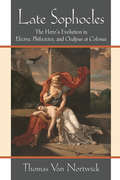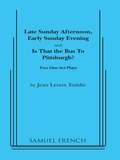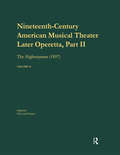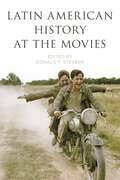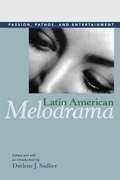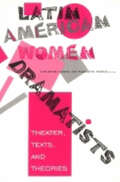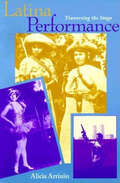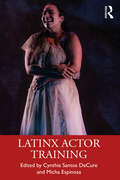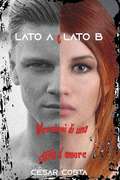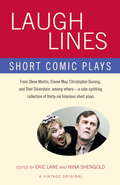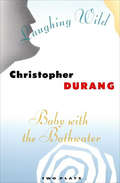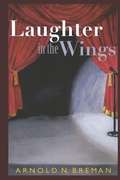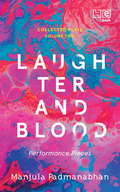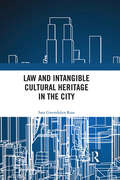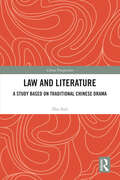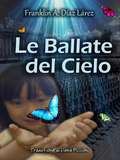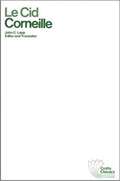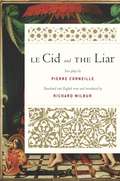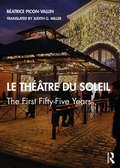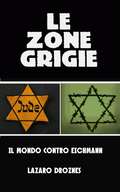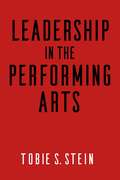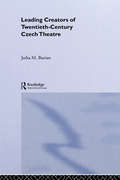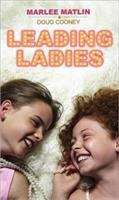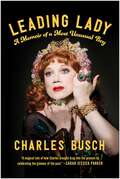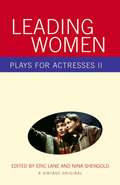- Table View
- List View
Late Sophocles: The Hero’s Evolution in Electra, Philoctetes, and Oedipus at Colonus
by Thomas Van NortwickOnly a few plays by Sophocles--one of the great tragic playwrights from Classical Athens--have survived, and each of them dramatizes events from the rich store of myths that framed literature and art. Sophocles' treatment evokes issues that were vividly contemporary for Athenian audiences of the Periclean age: How could the Athenians incorporate older, aristocratic ideas about human excellence into their new democratic society? Could citizens learn to be morally excellent, or were these qualities only inherited? What did it mean to be a creature who knows that he or she must die? Late Sophocles traces the evolution of the Sophoclean hero through the final three plays, Electra, Philoctetes, and Oedipus at Colonus. The book's main thesis, that Sophocles reimagined the nature of the tragic hero in his last three works, is developed inductively through readings of the plays. This balanced approach, in which a detailed argument about the plays is offered in a format accessible to nonspecialists, is unusual--perhaps unique--in contemporary Classical scholarship on Sophocles. This book will appeal to nonspecialist readers of serious literature as well as scholars of classical and other literatures. While including ample guidance for those not familiar with the plays, Late Sophocles goes beyond a generalized description of "what happens" in the plays to offer a clear, jargon-free argument for the enduring importance of Sophocles' plays. The argument's implications for longstanding interpretational issues will be of interest to specialists. All Greek is translated.
Late Sunday Afternoon, Early Sunday Evening
by Jean Lenox ToddieComedy/Drama / 2 f. / Bare stage / Lovely Olivia walks through the rooms of her Boston home with hyacinths in her arms and amethysts in her ears, remembering her past incarnations and finding this one lacking in excitement. Her granddaughter is due; she has an announcement to make!
Later Operetta 2: the Highwayman, Music by Reginald DeKoven, Libretto by Harry B. Smith, 1897 (Nineteenth-Century American Musical Theater Series)
by Reginald De KovenThe most successful American-born composer of operetta at the end of the nineteenth century was Reginald de Koven. The work reprinted in this volume, The Highwayman, is arguably his best work, although he is better known for the earlier Robin Hoodwixh its evergreen wedding ballad "Oh Promise Me." (Robin Hood is available as a reprint in the 1990 volume American Opera and Music for the Stage, in the G.K. Hall series Three Centuries of American Music.) The editor of this volume, Orly Leah Krasner, is a leading scholar of de Koven’s music. She teaches at the City University of New York, and her Ph.D. dissertation, "Reginald de Koven (1859-1920) and American Comic Opera at the Turn of the Century," is also from that university. Her introduction places the work in the tenor of contemporary critical reaction, and lists the sources available for further study. The Highwayman is one of the few complete operettas of its era for which we are fortunate enough to have original performing materials in the composer’s own hand. As the penultimate volume (number 15) in this series, de Koven’s work of 1897 contrasts with two works of the previous year, Walter Damrosch’s opera The Scarlet Letter (volume 16) and John Philip Sousa’s operetta El Capitan (volume 14).
Latin American History at the Movies
by Edited by Donald F. StevensMovies are meant to be entertaining, but they can also be educational. People are naturally curious to know how much of what they see on their screens might be historically true. In Latin American History at the Movies, experts on Latin America focus on five centuries of history as portrayed in feature films. An introduction on the visual presentation of the past in movies sets the stage for essays that explore sixteen of the best feature films on Latin America made from the 1980s to the present.
Latin American Melodrama: Passion, Pathos, and Entertainment
by Darlene J. SadlierLike their Hollywood counterparts, Latin American film and TV melodramas have always been popular and highly profitable. The first of its kind, this anthology engages in a serious study of the aesthetics and cultural implications of Latin American melodramas. Written by some of the major figures in Latin American film scholarship, the studies range across seventy years of movies and television within a transnational context, focusing specifically on the period known as the "Golden Age" of melodrama, the impact of classic melodrama on later forms, and more contemporary forms of melodrama. An introductory essay examines current critical and theoretical debates on melodrama and places the essays within the context of Latin American film and media scholarship. Contributors are Luisela Alvaray, Mariana Baltar, Catherine L. Benamou, Marvin D'Lugo, Paula Félix-Didier, Andrés Levinson, Gilberto Perez, Darlene J. Sadlier, Cid Vasconcelos, and Ismail Xavier.
Latin American Women Dramatists: Theater, Texts, and Theories
by Catherine Larson and Margarita Vargas&“This thoughtfully crafted . . . insightful and informative [anthology] elucidates an overlooked, essential component of the Latin American literary canon&” (Choice).Latin American Women Dramatists sheds much-needed light on the significant contributions made by these pioneering authors during the last half of the twentieth century. Contributors discuss fifteen works of Latin-American playwrights, delineate the artistic lives of women dramatists from countries as diverse as Argentina, Brazil, Chile, Mexico, Puerto Rico, and Venezuela. Looking at these writers and their work from political, historical, and feminist perspectives, this anthology also underscores the problems inherent in writing under repressive governments.&“The book highlights the many possibilities of the innovative work of these dramatists, and this will, it is to be hoped, help the editors to achieve one of their other key goals: productions of the plays in English.&” —Times Literary Supplement, UK
Latina Performance: Traversing the Stage
by Alicia ArrizónA study exploring the role of Latina women in theater performance, literature, and criticism.Arrizón’s examination of Latina performance spans the twentieth century, beginning with oral traditions of corrido and revistas. She examines the soldadera and later theatrical personalities such as La Chata Noloesca and contemporary performance artist Carmelita Tropicana.Latina Performance considers the emergence of Latina aesthetics developed in the United States, but simultaneously linked with Latin America. As dramatists, performance artists, protagonists, and/or cultural critics, the women Arrizón examines in this book draw attention to their own divided position. They are neither Latin American nor Anglo, neither third- or first-world; they are feminists, but not quite “American style.” This in-between-ness is precisely what has created Latina performance and performance studies, and has made “Latina” an allegory for dual national and artistic identities.“Alicia Arrizón’s Latina Performance is a truly innovative and important contribution to Latino Studies as well as to theater and performance studies.” —Diana Taylor, New York University“Arrizón’s . . . important book revolves around the complex issues of identity formation and power relations for US women performers of Latin American descent. . . . Valuable for anyone interested in theater history and criticism, cultural studies, gender studies, and ethnic studies with attention to Mexican American, Chicana/o, and Latina/o studies. Upper—division undergraduates through professionals.” —E. C. Ramirez, Choice
Latinx Actor Training
by Cynthia Santos DeCure Micha EspinosaLatinx Actor Training presents essays and pioneering research from leading Latinx practitioners and scholars in the United States to examine the history and future of Latino/a/x/e actor training practices and approaches. Born out of the urgent need to address the inequities in academia and the industry as Latinx representation on stage and screen remains disproportionately low despite population growth; this book seeks to reimagine and restructure the practice of actor training by inviting deep investigation into heritage and identity practices. Latinx Actor Training features contributions covering current and historical acting methodologies, principles, and training, explorations of linguistic identity, casting considerations, and culturally inclusive practices that aim to empower a new generation of Latinx actors and to assist the educators who are entrusted with their training. This book is dedicated to creating career success and championing positive narratives to combat pervasive and damaging stereotypes. Latinx Actor Training offers culturally inclusive pedagogies that will be invaluable for students, practitioners, and scholars interested in the intersections of Latinx herencia (heritage), identity, and actor training.
Lato A e Lato B: Versioni di una storia d’amore
by César CostaLato A e Lato B - Versioni di una storia d’amore Un romanzo pieno di colpi di scena, sorprese e drammi Roberto incontra l’amore della sua vita quando Jennifer si trasferisce nella stessa via in cui lui abita. Mentre vive incontri e scontri alla ricerca della sua passione adolescenziale, si sviluppa una bella e innocente storia d’amore, ricca di momenti emozionanti e dolorosi. Quando finalmente il destino sembra aiutare la coppia, scopriremo che esiste più di una versione, che spesso la realtà non è come sembra e che leggere i fatti da una nuova angolazione può cambiare tutta la prospettiva della storia.
Laugh Lines: Short Comic Plays
by Eric Lane Nina ShengoldThis one-of-a-kind anthology features thirty-six hilarious short plays by major American playwrights and emerging new voices, all guaranteed to send readers and audiences into peals of laughter. From the surrealistic wit of Steve Martin's "The Zig-Zag Woman" to the biting political satire of Steven Dietz's "The Spot," from Christopher Durang's wonderfully loopy "Wanda's Visit" to Shel Silverstein's supremely twisted "The Best Daddy," there's something in here to make everyone laugh. There are plays for casts of all sizes, from monologues to large ensembles, with diverse and challenging roles for actors of every age and type. Even the titles are funny: Mark O'Donnell's "There Shall Be No Bottom (a bad play for worse actors)," Elaine May's "The Way of All Fish," and Alan Ball's "Your Mother's Butt. " A bonanza for theatergoers, performers, and comedy fans,Laugh Lineswill bring down the house. From the Trade Paperback edition.
Laughing Wild and Baby with the Bathwater: Two Plays (Books That Changed the World)
by Christopher DurangA pair of plays from the comic genius who gave us the Tony Award-winning Vanya and Sonia and Masha and Spike.Baby and the Bathwater follows its main character from infancy to adulthood, in a confusing search for identity after an unusual upbringing. In Laughing Wild, two comic monologues evolve into a man and a woman’s shared nightmare of modern life and the isolation it creates. From her turf battles at the supermarket to the desperate clichés of self-affirmation he learns at his “personality workshop,” they run the gamut of everyday life’s small brutalizations until they meet, with disastrous inevitability, at the Harmonic Convergence in Central Park.The fiercely ironic dark comedy of Christopher Durang can be perfectly described by the quotation—by Thomas Gray via Samuel Beckett—that inspired one of these play’s titles: “Laughing wild amid severest woe.”“One of the funniest dramatists alive, and one of the most sharply satiric.”—The New Yorker
Laughter In The Wings
by Arnold BremanAfter nearly a half-century of directing American performing arts centers, impresario Arnold N. Breman has seen it all: eccentric songwriters, spotlight-craving comedians and insecure entertainers. In his memoir, Breman recalls encounters with some of the most beloved performers of our time, including: Ella Fitzgerald, Benny Goodman, Sarah Vaughan, Sammy Davis, Jr. , Cab Calloway, Isaac Stern, Itzhak Perlman, Beverly Sills, Marcel Marceau, Cary Grant, Lucille Ball, Gene Kelly, Gregory Hines, Linda Ronstadt, Red Skelton, Victor Borge and many others. This is the story of crowd-pleasers who left audiences dazzled and managers frantic, told with wit and candor of a presenter who kept laughing through it all.
Laughter and Blood: Performance Pieces
by Manjula PadmanabhanConjoined triplets on a blind date. A lesson in human reproduction by a manic-prudish teacher. A heart-stopping game of cards. An instrument that tunes in to the music of our bodies’ organs.Collected Plays brings together, in a much-anticipated series, the dramatic works of Onassis prize-winning playwright and author Manjula Padmanabhan.Laughter and Blood, the second volume, presents within its covers Padmanabhan’s short performance pieces. From The Sextet and Ladies’ Night to Hidden Fires and Blind Date, these wildly inventive, subversive and often chilling plays introduce readers to the intrigues of inverted power structures, tantalizingly suggestive interactions and powerful voices from the fringe.With new introductions to the works that affirm the relevance of the themes of the plays, this collection showcases the playwright’s mastery of her art and reconfirms her standing among the leading dramatists of our time.
Law and Intangible Cultural Heritage in the City
by Sara Gwendolyn RossWith disappearing music venues, and arts and culture communities at constant risk of displacement in our urban centers, the preservation of intangible cultural heritage is of growing concern to global cities. This book addresses the role and protection of intangible cultural heritage in the urban context. Using the methodology of Urban Legal Anthropology, the author provides an ethnographic account of the civic effort of Toronto to become a Music City from 2014-18 in the context of redevelopment and gentrification pressures. Through this, the book elucidates the problems cities like Toronto have in equitably protecting intangible cultural heritage and what can be done to address this. It also evaluates the engagement that Toronto and other cities have had with international legal frameworks intended to protect intangible cultural heritage, as well as potential counterhegemonic uses of hegemonic legal tools. Understanding urban intangible cultural heritage and the communities of people who produce it is of importance to a range of actors, from urban developers looking to formulate livable and sustainable neighbourhoods, to city leaders looking for ways in which their city can flourish, to scholars and individuals concerned with equitability and the right to the city. This book is the beginning of a conservation about what is important for us to protect in the city for future generations beyond built structures, and the role of intangible cultural heritage in the creation of full and happy lives. The book is of interest to legal and sociolegal readers, specifically those who study cities, cultural heritage law, and legal anthropology.
Law and Literature: A Study Based on Traditional Chinese Drama (China Perspectives)
by Zhu SuliBased on the texts of traditional Chinese dramas such as The Orphan of Zhao, Liang Shangbo and Zhu Yingtai, The Injustice to Dou E, and The Fifteen Strings of Cash, the book aims to broaden the scope of law and literature in China.Adopting a comprehensive and interdisciplinary approach of legal theory, literature, sociology, economics, and political science, the author analyzes some theoretical issues that are of the law or relevant to law in these literary playscripts, which breaks the Chinese tradition of moral reading and integrates literary study or humanitarian studies into the study of social sciences. In addition, the book discusses the history, status quo, and prospects of law and literature research in China and reflects on its value and methodology.The book will appeal to scholars and postgraduate students of legal theory, Chinese literature, and legal history.
Le Ballate del Cielo
by Franklin A. Díaz Lárez Elena PiccioniIn un Paese asiatico, una catena di strani accadimenti lascia la sua amara impronta di desolazione in centinaia di persone. Per decenni si contano dispersi, senza alcuna spiegazione. Un mistero insolito e insospettabile, riguardo al quale solo molti anni dopo iniziano ad apparire piste affidabili. Contemporaneamente, dalla parte opposta del pianeta, un giovane avvocato va incontro a un duro scontro con la realtà quando inizia a esercitare la propria professione in maniera indipendente. Colpito da ciò che vede, decide di rifugiarsi in un'altra attività legata alla sua formazione accademica, senza sospettare che, nel farlo, dovrà avventurarsi nei più intricati meandri delle sue paure, delle sue insicurezze e confrontarsi con i fantasmi del passato, che non lo hanno mai abbandonato. Per uno strano caso, le due storie si incroceranno e la conclusione sarà di forte impatto, un qualcosa che nessuno riesce a immaginare.
Le Cid (Crofts Classics #18)
by Pierre Corneille John C. LappEdited and translated by John C. Lapp, this edition of Le Cid for performance and study includes an introduction, which interprets the contemporary political, social, and romantic themes that give this tragedy its complex, interwoven structure. Also included are a selected bibliography and a list of the principal dates in the life of Corneille.
Le Cid and The Liar
by Pierre Corneille Richard WilburRichard Wilbur's translations of the great French dramas have been a boon to acting troupes, students of French literature and history, and theater lovers. He continues this wonderful work with two plays from Pierre Corneille: Le Cid is Corneille's most famous play, a tragedy set in Seville that illuminates the dangers of being bound by honor and the limits of romantic love; The Liar is a farce, set in France and dealing with love,misperceptions, and downright falsifications, which ends, of course, happily ever after. These two plays, together in one volume, work in perfect tandem to showcase the breadth of Corneille's abilities. Taking us back to the time he portrays as well as the time of his greatest success as a playwright, they remind us of that the delights to be found on the French stage are truly ageless.
Le Théâtre du Soleil: The First Fifty-Five Years
by Béatrice Picon-VallinLe Théâtre du Soleil traces the company’s history from a group of young, barely trained actors, directors, and designers struggling to match their political commitment to a creative strategy, to their grappling with the concerns of migration, separation and exile in the early decades of the twenty-first century. Béatrice Picon-Vallin recounts how, in the 55 years since its founding, the Théâtre du Soleil has established itself as one of the foremost names in modern theatre. Ariane Mnouchkine and her collaborators have developed a unique and ever-evolving style that combines a piercing richness of shape, color, and texture with precision choreography, innovative musical accompaniment, and multi-layered, metaphorical dreamscapes. This rich, storied history is illustrated by a wealth of spectacular rehearsal and production photos from the company's own archive and interviews with dozens of past and present members, including Mnouchkine herself. Judith G. Miller’s timely translation of the first comprehensive history and analysis of a remarkable, award-winning company is a compelling read for both students and teachers of Drama and Theatre Studies.
Le zone grigie: il mondo contro Eichmann
by Lázaro Droznes Stefano VazzolaIn questa libera ricostruzione del processo di Eichmann passiamo in rivista i temi che fanno la loro comparsa e continueranno a comparire fintanto che esisterà l'Umanità: la natura del nazionalsocialismo, la banalità del male esercitata dalla scrivania di un burocrate che uccide semplicemente trafficando con documenti e orari di treni, i limiti dell'obbedienza dovuta, la passività del popolo ebraico, la complicità della classe dirigente delle comunità ebraiche, l'indifferenza degli Alleati e della Chiesa di fronte alla mattanza e il retaggio che successivamente rese possibile la fondazione dello Stato ebraico. Il nazismo e l'olocausto ebraico sono un fatto storico che continuiamo a cercare di capire pur sapendo che non ci riusciremo mai. Com'è potuta succedere una cosa simile? Ci sarebbe stato uno Stato ebraico senza Hitler, senza il nazismo e senza l'Olocausto? È il prezzo che hanno dovuto pagare gli ebrei per avere un proprio Stato?
Leadership in the Performing Arts
by Tobie S. Stein Robert L. LynchWhat does it mean to be a performing arts leader? Leadership in the Performing Arts addresses and analyzes this question by presenting the wisdom and expertise of eleven men and women with experience leading nonprofit performing arts institutions in the United States. These successful leaders provide many real-world examples of business practices that may be generally applied by practitioners in our field, and throughout the nonprofit sector. The book examines: The leader’s career path and professional growthThe leader’s visionLeadership styles and the importance of interpersonal skillsSetting and executing organizational prioritiesLeading decision-making and communication processesCreating change and innovationChallenges faced in leading an institutionInterviewees include: Kathy Brown, executive director of the New York City Ballet; Peter Gelb, general manager of the Metropolitan Opera; Heather Hitchens, president of the American Theatre Wing; Karen Brooks Hopkins, president and chief executive officer of the Brooklyn Academy of Music; Timothy J. McClimon, president of the American Express Foundation; Laura Penn, executive director of the Stage Directors and Choreographers Society; Arlene Shuler, president and chief executive officer of New York City Center; Paul Tetreault, director of Ford's Theatre; Nancy Umanoff, executive director of the Mark Morris Dance Group; Patrick Willingham, executive director of The Public Theater; and Harold Wolpert, managing director of the Roundabout Theatre Company.Allworth Press, an imprint of Skyhorse Publishing, publishes a broad range of books on the visual and performing arts, with emphasis on the business of art. Our titles cover subjects such as graphic design, theater, branding, fine art, photography, interior design, writing, acting, film, how to start careers, business and legal forms, business practices, and more. While we don't aspire to publish a New York Times bestseller or a national bestseller, we are deeply committed to quality books that help creative professionals succeed and thrive. We often publish in areas overlooked by other publishers and welcome the author whose expertise can help our audience of readers.
Leading Creators of Twentieth-Century Czech Theatre (Routledge Harwood Polish And East European Theatre Archive Ser. #Vol. 7)
by Jarka M. BurianIn this invaluable and detailed presentation of the leading creative figures in a richly innovative and dynamic period of Czech theatre, Professor Jarka M. Burian provides us with insightful portraits of the directors K. H. Hilar, E. F. Burian, Alfred Radok, and Otomar Krejca: of the famous Voskovec and Werich comedic duo; of the scenographer Josef Svoboda; and of the playwright, now President of the Czech Republic, Václav Havel. There are also briefer studies of numerous other directors, designers, and actors. The author, a Czech-American theatre scholar and practitioner, has been a frequent on-site observer of Czech theatre since 1965. He is directly acquainted with many of the major artists and the most notable productions that have made Czech theatre internationally famous.
Leading Ladies
by Marlee Matlin Doug CooneyMegan's fourth-grade class is putting on their own original musical based on the book The Wizard of Oz, and Megan wants to be the star of the show and play Dorothy. Since she's deaf, she will sign the songs for her audition. However, a problem develops when Lizzie, her best friend from camp, transfers from her all-deaf school to Megan's class - and signs the same two songs that Megan was going to do! Luckily, Megan has some other ideas up her sleeve...
Leading Lady: A Memoir of a Most Unusual Boy
by Charles BuschA poignant, deliciously anecdotal account of a talented artist's Oz-like journey in the worlds of Off-Broadway, Broadway, and Hollywood The Tony Award-nominated writer of The Tale of the Allergist&’s Wife and the long-running hit Off-Broadway play Vampire Lesbians of Sodom, and a Sundance Festival award winner, Charles Busch has created a unique place in the entertainment world as a playwright, LGBT icon, drag actor, director, and cabaret performer, with his extraordinary gift for both connecting with and channeling the leading ladies of show business. In wonderfully readable chapters, by turns comic and moving, Charles writes how ever since his mother's death when he was seven, he has sought out surrogate mothers in his life. In his teens, Charles moved to Park Avenue in Manhattan to live with his Auntie Mame-like Aunt Lil, who encouraged and nourished Charles&’ talents and dreams, and eventually he discovered his gifts for writing plays and performing as a male actress. Busch also shares his colorful and sometimes outlandish interactions with film and theatrical luminaries including the hilarious comedian Joan Rivers (who became a mother figure to Charles after Aunt Lil&’s death), Angela Lansbury (who attended her first Passover seder with Charles), Rosie O&’Donnell, Claudette Colbert, Valerie Harper, Kim Novak, and many others. Full of both humor and heart and featuring rare photos, Leading Lady is for readers of entertainment books as well as anyone who enjoys real-life stories of artists who break the mold, ditch the boundaries, and find their own unique way to sparkle.
Leading Women: Plays For Actresses II
by Eric Lane Nina ShengoldGather any group of actresses, from students to stars, and someone will inevitably ask, "Where are all the great roles for women?" The roles are right here, in this magnificently diverse collection of plays-full-lenghts, one-acts, and monologues--with mainly female casts, which represent the answer to any actress's prayer. The editors of the groundbreaking anthology Plays for Actresses have once again gathered an abundance of strong female roles in a selection of works by award-winning authors and cutting-edge newer voices, from Wendy Wasserstein and Christopher Durang to Claudia Shear, Eve Ensler, and Margaret Edson. The characters who populate these seven full-length plays, four ten-minute plays, and eleven monologues include a vivid cross-section of female experience: girl gang members, Southern debutantes, pilots, teachers, traffic reporters, and rebel teenagers. From a hilarious take on Medea to a taboo-breaking excerpt from The Vagina Monologues to a moving scene from the Pulitzer Prize-winning Wit, the plays in Leading Women are complex, funny, tragic, and always original--and a boon for talented actresses everywhere.
